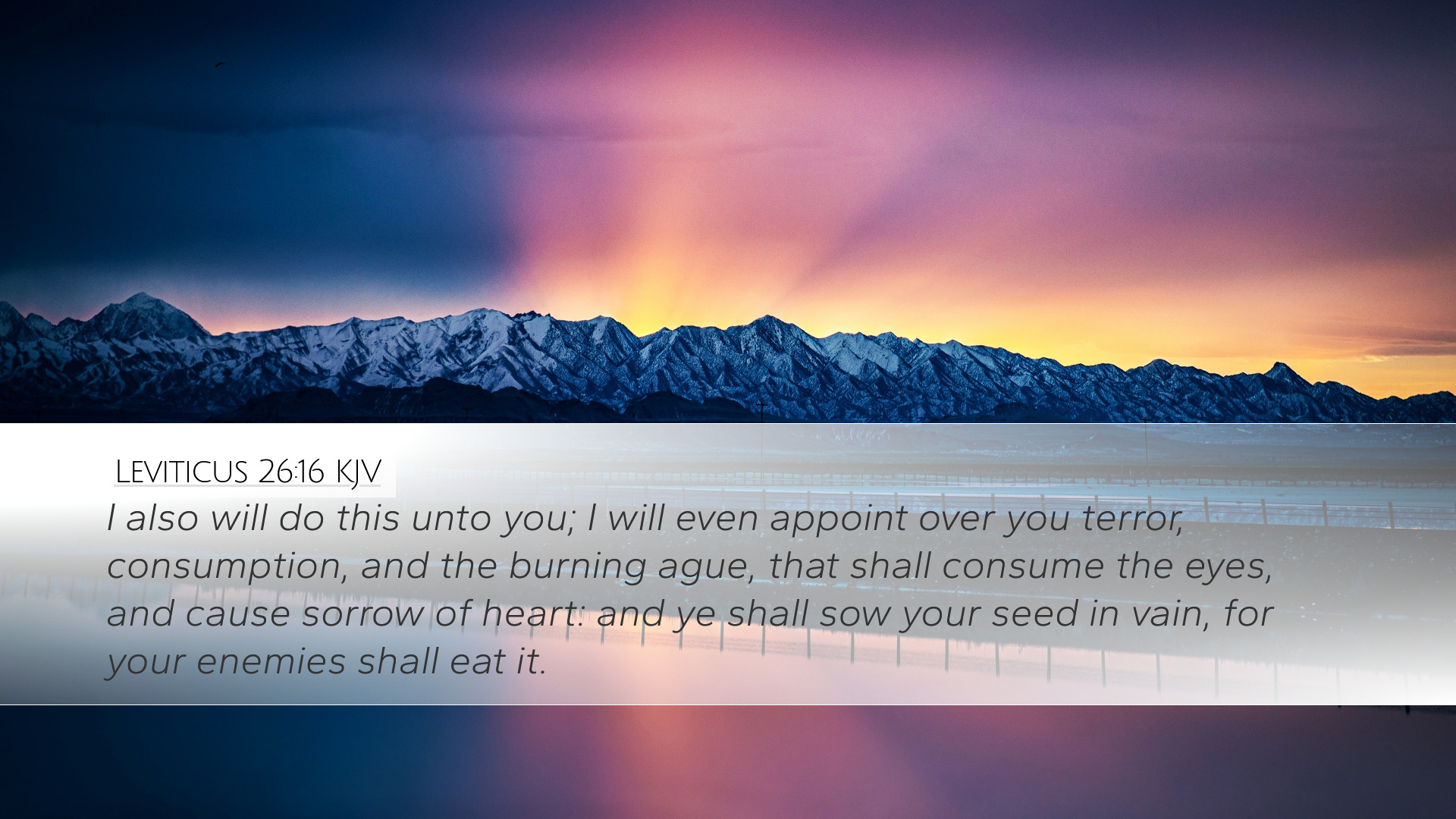Commentary on Leviticus 26:16
Leviticus 26:16 declares:
"I also will do this unto you; I will even appoint over you terror, consumption, and the burning ague, that shall consume the eyes, and cause sorrow of heart: and ye shall sow your seed in vain, for your enemies shall eat it."
General Overview
This verse is a part of a larger section in Leviticus where God outlines the blessings for obedience and the curses for disobedience to His commandments. The context of this chapter emphasizes the covenant relationship between God and Israel, indicating that their actions directly influence the nature of their relationship with God.
Commentary Insights
Matthew Henry
Matthew Henry notes that this verse represents the consequences of forsaking God’s laws. He emphasizes that God’s covenantal promise is conditional, and when the Israelites reject His statutes, they open themselves to divine retribution. He outlines several key points:
- Terror: Henry interprets "terror" as a psychological affliction that disturbs the peace of mind and instills fear among the people, leading to a sense of helplessness.
- Consumption: This term refers to physical ailments, underscoring the idea that disobedience leads to both spiritual and physical degradation.
- Burning Ague: This phrase points to debilitating fever conditions that sap strength and vitality, illustrating the comprehensive nature of the curse upon their health.
- Sorrow of Heart: This comment highlights that God does not only punish outward behaviors but also the inward emotional turmoil brought on by a broken relationship with Him.
Albert Barnes
Albert Barnes offers a concise analysis of the punishments mentioned, identifying them as a direct result of rebellion against God. He articulates a few vital ideas:
- The Link between Sin and Suffering: Barnes stresses that the suffering described is intrinsically linked to the sin of the people. The suffering is portrayed as formative, intended to captivate the hearts towards repentance.
- Vulnerability to enemies: The prospect of enemies eating their harvest symbolizes defeat and humiliation, reinforcing the notion that their security is forfeited at the moment of turning away from God.
- Physical and Spiritual Consequences: He notices the duality of consequences—while the curse manifests in physical ailments, its root extends to spiritual disobedience.
Adam Clarke
Adam Clarke elaborately connects this passage with the principles of divine justice. He comments on several key aspects:
- Symbolism of the Conditions: Clarke interprets the effects of sin resulting in despair as symbolic of the larger spiritual decay. The "terror" signifies a disconnection from God, which manifests in all realms of life.
- Divine Retribution: Clarke emphasizes that the curses described are a form of divine retribution; they serve as reminders of God's glory and the significant need for His presence.
- Covenantal Responsibility: Clarke discusses the weight of the covenant which Israel bears, noting that their relationship with God is contingent on their faithfulness to His commandments.
Theological Implications
This verse presents numerous theological implications for understanding Israel’s relationship with God and the nature of divine justice:
- Covenant Theology: The blessings and curses are tied to the concept of covenant theology, emphasizing God’s expectation of fidelity from His people.
- The Nature of Divine Justice: God’s justice is both retributive and restorative; while punishment is enacted, it also serves the purpose of guiding His people to repentance.
- The Balance of Fear and Hope: The terror that God promises serves to remind the people of His sovereignty, inviting them to look towards Him for rescue and hope.
Applications for Today
For contemporary readers, this verse speaks to the continuing relevance of faithfulness to God:
- Discernment in Disobedience: Modern believers are encouraged to discern the consequences of turning away from God and to foster an intimate relationship with Him through obedience.
- Understanding Pain and Suffering: The exploration of physical ailments and psychological distress encourages a holistic understanding of suffering, inviting individuals to seek God as their ultimate healer.
- Reflecting on the Nature of Worship: The serious nature of covenantal relationship prompts a reflection on contemporary worship practices, urging believers to align their lives more closely with scriptural mandates.
Conclusion
In summary, Leviticus 26:16 serves as a powerful reminder of the terms of God’s covenant with His people. Through various commentaries, the text reveals profound truths about the nature of sin, consequences, and the necessity of faithfulness. For pastors, students, theologians, and scholars, this verse beckons a deep reflection on the unchanging character of God amidst the dynamic realities of human experience.


